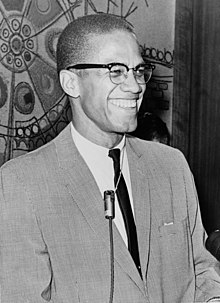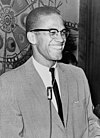
Malcolm X was an American Muslim minister and human rights activist who was a prominent figure during the civil rights movement. A spokesman for the Nation of Islam until 1964, he was a vocal advocate for Black empowerment and the promotion of Islam within the Black community. A posthumous autobiography, on which he collaborated with Alex Haley, was published in 1965.

A slave name is the personal name given by others to an enslaved person, or a name inherited from enslaved ancestors. The modern use of the term applies mostly to African Americans and Afro-Caribbeans who are descended from enslaved Africans who retain the name given to their ancestors by the enslavers.
"The slave master who owned us put his last name on us to denote that we were his property. So when you see a negro today who’s named Johnson, if you go back in his history you will find that his grandfather, or one of his forefathers, was owned by a white man who was named Johnson. My father didn’t know his last name. My father got his last name from his grandfather, and his grandfather got it from his grandfather, who got it from the slave master. The real names of our people were destroyed during slavery."

Louis Farrakhan is an American black supremacist and anti-white cult leader who heads the Nation of Islam (NOI). Prior to joining the NOI, he was a calypso singer who used the stage name Calypso Gene. Earlier in his career, he served as the minister of mosques in Boston and Harlem and was appointed National Representative of the Nation of Islam by then NOI leader Elijah Muhammad. He adopted the name Louis X, before being named Louis Farrakhan.
A number of organizations and academics consider the Nation of Islam (NOI) to be antisemitic. The NOI has engaged in Holocaust denial, proposes antisemitic, false interpretations of the Holocaust, and exaggerates the role of Jews in the African slave trade; mainstream historians, such as Saul S. Friedman, have said Jews had a negligible role. The NOI has repeatedly rejected charges made against it as false and politically motivated.
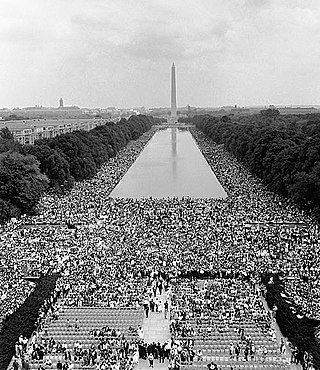
The March on Washington for Jobs and Freedom, also known as simply the March on Washington or The Great March on Washington, was held in Washington, D.C., on August 28, 1963. The purpose of the march was to advocate for the civil and economic rights of African Americans. At the march, final speaker Dr. Martin Luther King Jr., standing in front of the Lincoln Memorial, delivered his historic "I Have a Dream" speech in which he called for an end to racism.

Elijah Muhammad was an American religious leader, black separatist, and self-proclaimed Messenger of Allah who led the Nation of Islam (NOI) from 1934 until his death in 1975. Muhammad was also the teacher and mentor of Malcolm X, Louis Farrakhan, Muhammad Ali, and his son, Warith Deen Mohammed.

Betty Shabazz, also known as Betty X, was an American educator and civil rights advocate. She was married to Malcolm X.
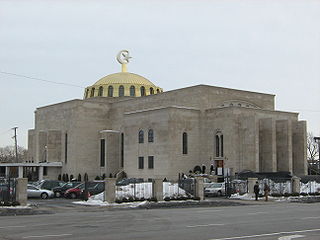
In the beliefs of the Nation of Islam (NOI), Yakub was a black scientist who lived 6,600 years ago and began the creation of the white race. He is said to have done this through a form of selective breeding which is referred to as "grafting", while he was living on the island of Patmos. The Nation of Islam's theology states that Yakub is the biblical Jacob.

"The Ballot or the Bullet" is the title of a public speech by human rights activist Malcolm X. In the speech, which was delivered on two occasions the first being April 3, 1964, at the Cory Methodist Church in Cleveland, Ohio and the second being on April 12th 1964 at the King Solomon Baptist Church, in Detroit, Michigan. Malcolm X advised African Americans to judiciously exercise their right to vote, but he cautioned that if the government continued to prevent African Americans from attaining full equality, it might be necessary for them to take up arms. It was ranked 7th in the top 100 American speeches of the 20th century by 137 leading scholars of American public address.
In political communication, the phrase "you are either with us, or against us" and similar variations are used to generate polarisation and reject non-partisanship. The implied consequence of not joining the partisan effort of the speaker is to be deemed an enemy. A contemporary example is the statement of former US President George W. Bush, who declared at the launch of his anti-terrorism campaign, "Every nation, in every region, now has a decision to make. Either you are with us, or you are with the terrorists."

This article is about the beliefs and theology of the Nation of Islam.

A house slave was a slave who worked, and often lived, in the house of the slave-owner, performing domestic labor. House slaves performed essentially the same duties as all domestic workers throughout history, such as cooking, cleaning, serving meals, and caring for children; however, their slave status could expose them to more significant abuses, including physical punishments and use as a sexual slave.
Too black, too strong is the short form of a Malcolm X quotation from his "Message to the Grass Roots". It may also refer to:
Black Power is a controversial political slogan and a name which is given to various associated ideologies which aim to achieve self-determination for black people. It is primarily, but not exclusively, used by black people activists and proponents of what the slogan entails in the United States. The Black Power movement was prominent in the late 1960s and early 1970s, emphasizing racial pride and the creation of black political and cultural institutions to nurture, promote and advance what was seen by proponents of the movement as being the collective interests and values of black Americans.

The Hate That Hate Produced is a television documentary about Black nationalism in the United States, focusing on the Nation of Islam and, to a lesser extent, the United African Nationalist Movement. It was produced in 1959 by Mike Wallace and Louis Lomax.

The Report to the American People on Civil Rights was a speech on civil rights, delivered on radio and television by United States President John F. Kennedy from the Oval Office on June 11, 1963 in which he proposed legislation that would later become the Civil Rights Act of 1964. Expressing civil rights as a moral issue, Kennedy moved past his previous appeals to legality and asserted that the pursuit of racial equality was a just cause. The address signified a shift in his administration's policy towards strong support of the civil rights movement and played a significant role in shaping his legacy as a proponent of civil rights.

The Autobiography of Malcolm X is an autobiography written by American minister Malcolm X, who collaborated with American journalist Alex Haley. It was released posthumously on October 29, 1965, nine months after his assassination. Haley coauthored the autobiography based on a series of in-depth interviews he conducted between 1963 and 1965. The Autobiography is a spiritual conversion narrative that outlines Malcolm X's philosophy of black pride, black nationalism, and pan-Africanism. After the leader was killed, Haley wrote the book's epilogue. He described their collaborative process and the events at the end of Malcolm X's life.

Second Baptist Church is a historically African-American Baptist church located in South Los Angeles, California. The current Lombardy Romanesque Revival building was built in 1926 and has been listed as a Los Angeles Historic-Cultural Monument (1978) and on the National Register of Historic Places (2009). The church has been an important force in the Civil Rights Movement, hosting national conventions of the National Association for the Advancement of Colored Persons ("NAACP") in 1928, 1942, and 1949, and also serving as the site of important speeches by Martin Luther King Jr., Malcolm X, and others. It is affiliated with the American Baptist Churches USA and the Progressive National Baptist Convention.
Council for United Civil Rights Leadership (CUCRL) was an umbrella group formed in June 1963 to organize and regulate the Civil Rights Movement. The Council brought leaders of Black civil rights organizations together with white donors in business and philanthropy. It successfully arranged the August 1963 March on Washington for Jobs and Freedom with the Kennedy administration.
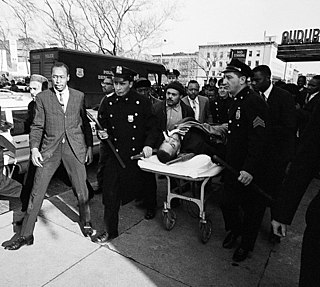
Malcolm X, an African American Muslim minister and human rights activist who was a popular figure during the civil rights movement, was assassinated in Manhattan, New York City on February 21, 1965. While preparing to address the Organization of Afro-American Unity at the Audubon Ballroom in the neighborhood of Washington Heights, Malcolm X was shot multiple times and killed. Three members of the Nation of Islam, Muhammad Abdul Aziz, Khalil Islam, and Thomas Hagan, were charged, tried, and convicted of the murder and given indeterminate life sentences, but in November 2021, Aziz and Islam were exonerated.
